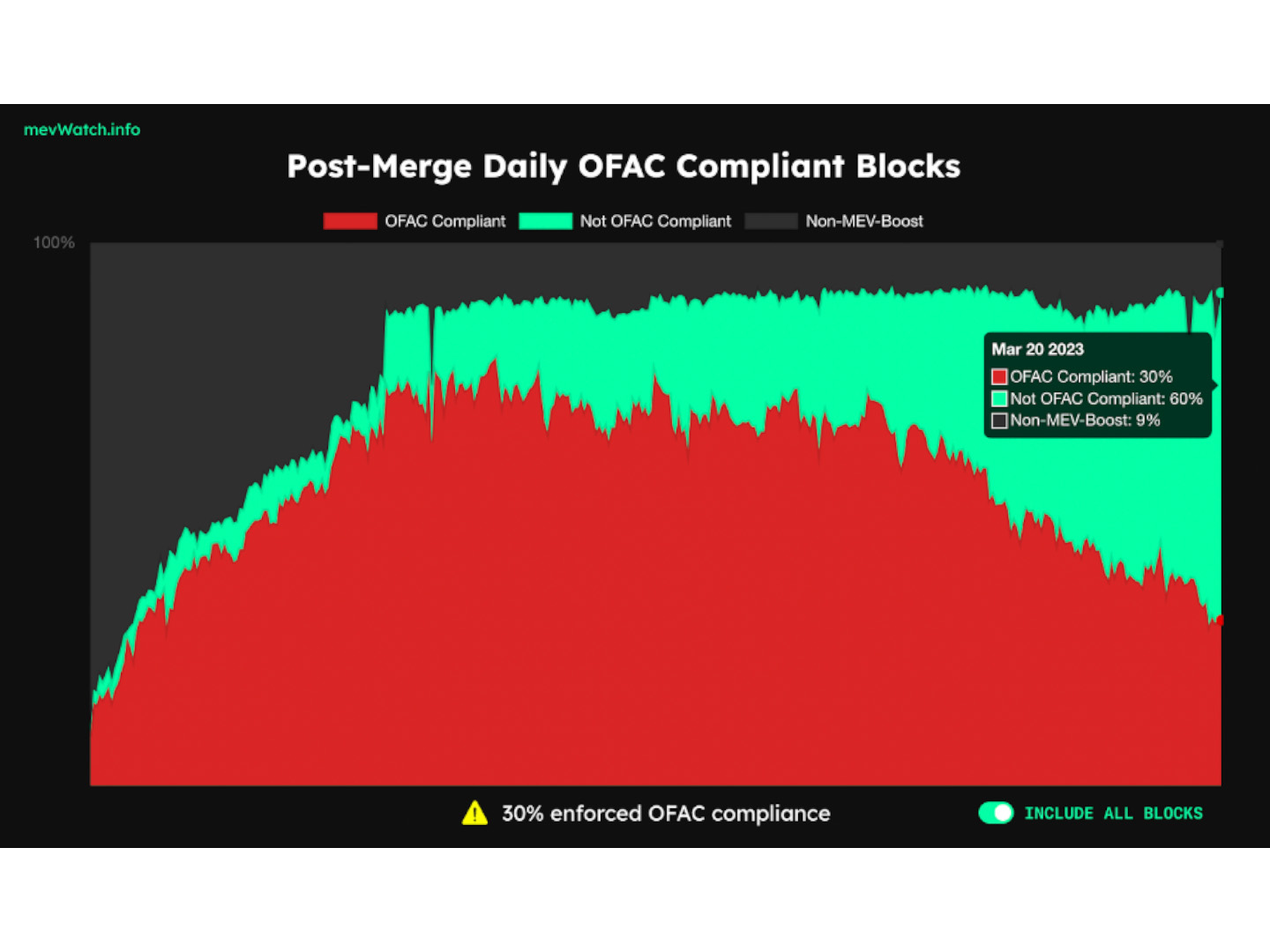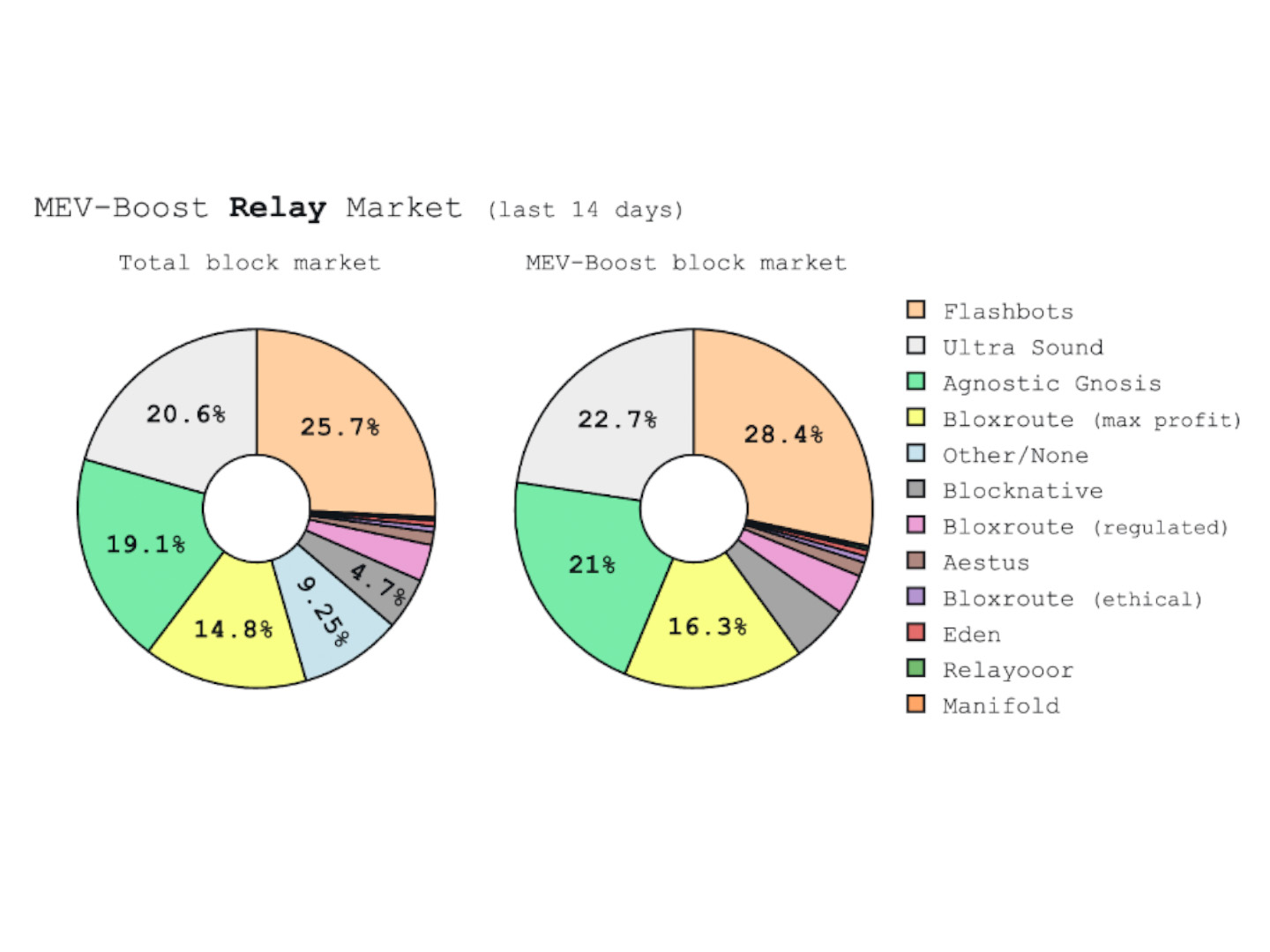Latest Ethereum Blocks Suggest Validators Are Reversing Censorship
Noncensoring relays such as Agnostic and ultra sound are delivering more data blocks on Ethereum than Flashbots, the one-time king of MEV-delivering relays.
:format(jpg)/cloudfront-us-east-1.images.arcpublishing.com/coindesk/KBKAJJP4ENFZBG3KKUQEJ33AF4.jpeg)
(Creative Commons, modified by CoinDesk)
Ethereum’s “censorship” problem seems to have changed course over the past six months. After the government's Office of Foreign Asset Control sanctioned Tornado Cash transactions to U.S. citizens in August, the vast majority of blocks added to the blockchain were OFAC compliant.
Now, the share of “censored” blocks has shrunk to less than a third – in what might be seen as a comeback for Ethereum’s anti-censorship ethos.
According to the site MEV Watch, during the past weekend and into the beginning of this week, roughly one in three blocks that made it onto the Ethereum blockchain was OFAC compliant. This means that about 30% of blocks excluded transactions sanctioned by the OFAC, including Tornado Cash.
This article originally appeared in Valid Points, CoinDesk’s weekly newsletter breaking down Ethereum’s evolution and its impact on crypto markets. Subscribe to get it in your inbox every Wednesday.
Flipping that around, more than two-thirds of blocks that made it onto the Ethereum blockchain over the last 24 hours are not OFAC compliant.

(mevwatch.info)
Just a month ago, Ethereum validators were still censoring about 50% of blocks that made it onto the blockchain. The last time that Ethereum had such low levels of censorship was Sept. 24, 2022.
What contributed to the reversal?
Since Ethereum went through the Merge in September, about 85% of the blocks that made it onto the blockchain participated in a middleware known as MEV-Boost, where validators can request pre-made blocks from builders.
MEV-Boost is a software that helps validators earn MEV, or maximal extractible value, which are profits that come from rearranging or including certain transactions within a block. The MEV-Boost software was innovated by Ethereum research and development team Flashbots in order to distribute MEV among validators more equally.
While MEV-Boost hasn’t been integrated into Ethereum at the protocol level, it’s widely used by the Ethereum ecosystem, as 85% of validators have relayed blocks via the middleware component. Flashbots also has its own relayer for validators to connect with, used by roughly 25% of validators.
After OFAC sanctioned Tornado Cash, there was debate over whether validators should include those transactions or not. Ever since then, the Ethereum community has continued to push for a censorship reversal, and the results of those efforts now appear to be paying off thanks, in large part, to the introduction of new, non-censoring relays.
At the time the sanctions went into effect, most validators were connected to Flashbots’ MEV-Boost relay, which Flashbots immediately programmed to censor transactions by default.
In response to community backlash, however, Flashbots raced to complete the process of open sourcing its code for MEV-Boost, so others could develop their own non-censoring relays.
In November, Agnostic and ultra sound relays with a non-censoring version of MEV-Boost were introduced. Since then, they have risen up in the ranks of relays delivering blocks on Ethereum. Flashbots accounts for delivering about 26% of the blocks over the past 14 days, while Agnostic and ultra sound each have delivered roughly 20% of the blocks over the past 14 days.

(mevboost.pics)
Over the weekend, Agnostic and ultra sound each delivered more blocks on Ethereum than Flashbots did.
Martin Köppelmann, co-founder of Gnosis Chain, which runs the Agnostic relay, told CoinDesk that “it took some time to get the word out and demonstrate that we offer a reliable relay.”
Now that validators have had the opportunity to experiment with MEV-Boost, many have started to turn to alternative relays like Agnostic and ultra sound.
“The number of validators that are connected to us is constantly growing,” Köppelmann said. “We were already able to deliver the most blocks of all relays for some period of time.”
DISCLOSURE
Please note that our privacy policy, terms of use, cookies, and do not sell my personal information has been updated.
The leader in news and information on cryptocurrency, digital assets and the future of money, CoinDesk is a media outlet that strives for the highest journalistic standards and abides by a strict set of editorial policies. CoinDesk is an independent operating subsidiary of Digital Currency Group, which invests in cryptocurrencies and blockchain startups. As part of their compensation, certain CoinDesk employees, including editorial employees, may receive exposure to DCG equity in the form of stock appreciation rights, which vest over a multi-year period. CoinDesk journalists are not allowed to purchase stock outright in DCG.
Learn more about Consensus 2023, CoinDesk’s longest-running and most influential event that brings together all sides of crypto, blockchain and Web3. Head to consensus.coindesk.com to register and buy your pass now.
:format(jpg)/www.coindesk.com/resizer/Kjea5zGf89qzyacI8fZ49yhnaks=/arc-photo-coindesk/arc2-prod/public/S7SPGELTNBFITA3UBCS2CMRBQM.png)
:format(jpg)/cloudfront-us-east-1.images.arcpublishing.com/coindesk/HHAZAAXSBJD3NLASNFQDKP3WOE.png)
:format(jpg)/cloudfront-us-east-1.images.arcpublishing.com/coindesk/3XAH3BH7BZE5ZNY2XTZ5BLD7QI.jpg)
:format(jpg)/cloudfront-us-east-1.images.arcpublishing.com/coindesk/MM3UAOZCG5AUZIPOQ65VFTGA4U.jpg)
:format(jpg)/cloudfront-us-east-1.images.arcpublishing.com/coindesk/Z3I2HMMBABCOJMIVKQT34UWXHI.jpg)